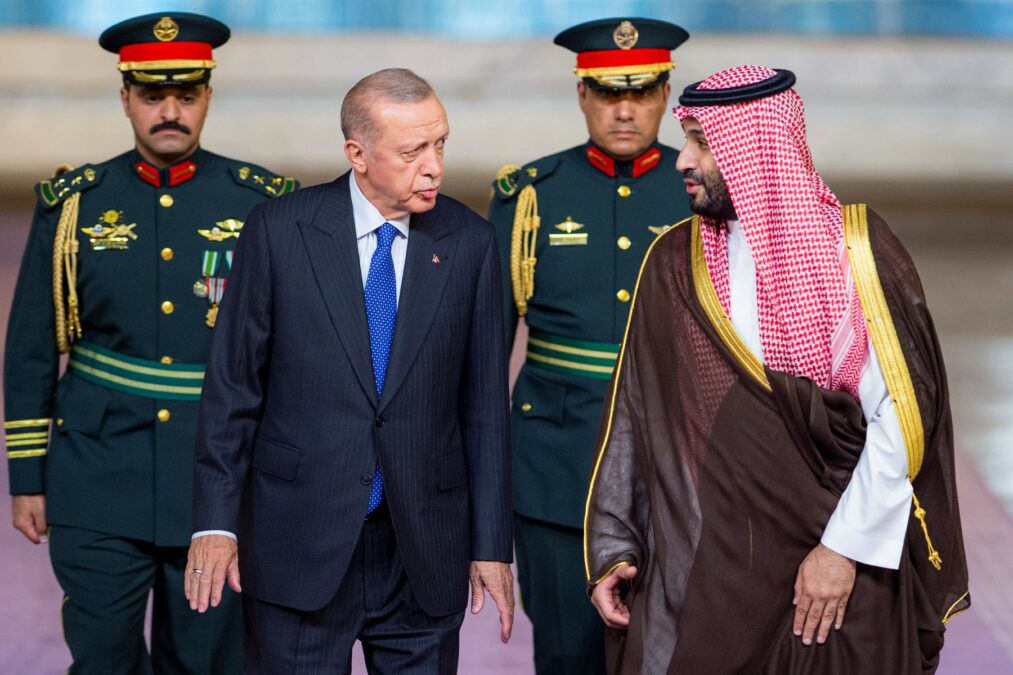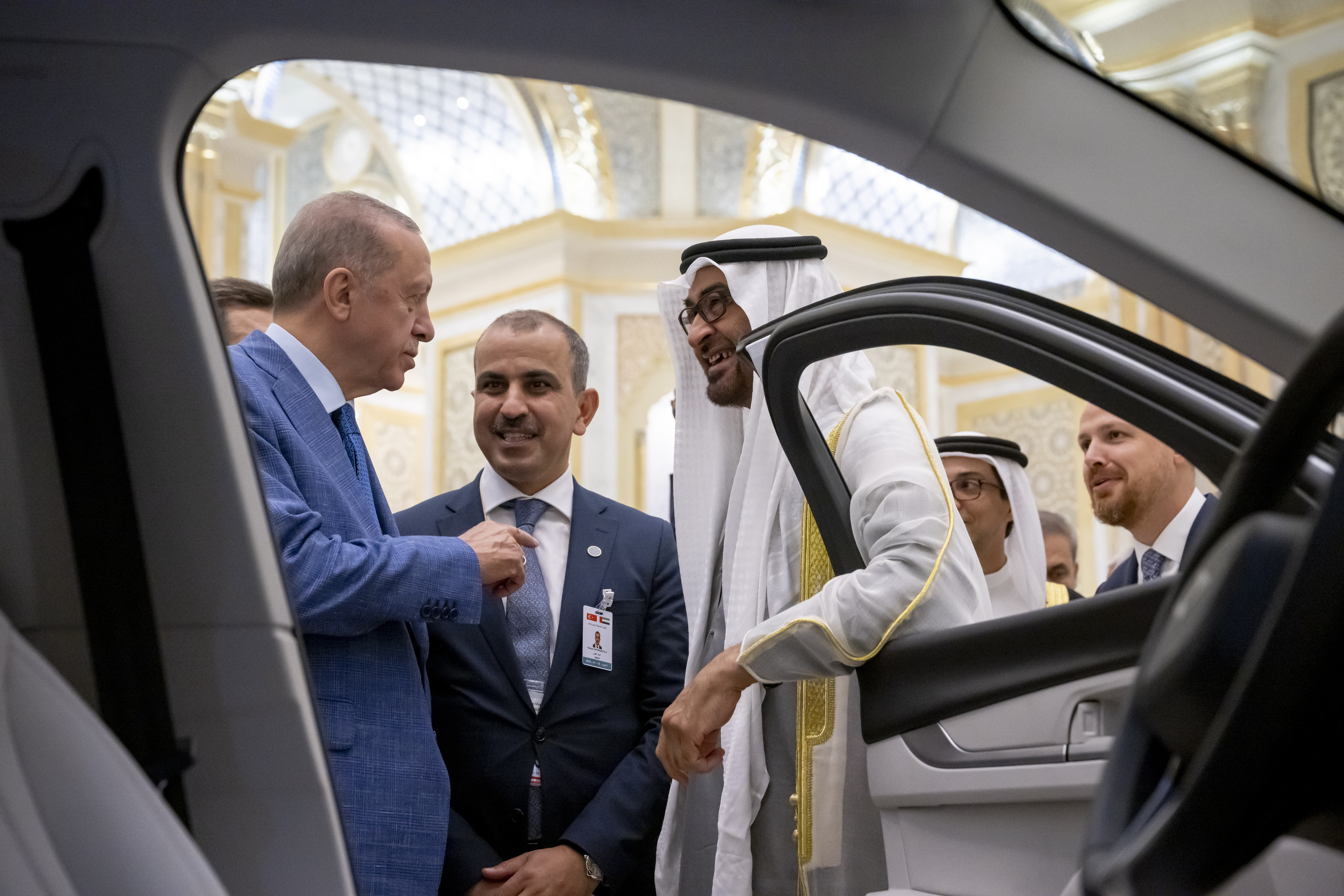Turkish President Recep Tayyip Erdogan has just finished his three-day visit to Saudi Arabia, Qatar and the United Arab Emirates (UAE). His trip’s diplomatic significance cannot be overstated, keeping in mind that Turkiye’s relations with the UAE and Saudi Arabia were troubled in recent years. With Qatar, however, Turkiye has always enjoyed a smooth relationship with the highest levels of trust.
The level of warmth Erdogan received in Saudi Arabia and the UAE is proof that there is genuine realization in the two countries that having good relations with Turkiye is not only good for bilateral benefits but serves the long-term strategic interests of regional peace and economic integration. The new climate of intra-Gulf cooperation also helps Turkiye in developing mutually trustworthy partnerships with Saudi Arabia and the UAE.
Turkiye supported Qatar versus Saudi Arabia and the UAE when a serious crisis erupted on the Arabian Peninsula due to Doha being put under a blockade in 2017 by its two bigger neighbors. The mood has clearly changed and everyone realizes the futility of confrontations, which are used by outside powers to keep the region weak, unstable and in misery.
It can be said that Turkiye’s relations with the Gulf region have reached a satisfactory level with this presidential visit. Both high symbolism and substance marked the visit. It is worth reflecting on who gained what from the remarkable trip.
Keeping in view Turkiye’s economic challenges, its current account deficit and the need to attract foreign investment, the Turkish president’s diplomatic task was clear. For the Gulf region, major concerns include geopolitical uncertainties, domestic and regional security stability, foreign meddling in Arab affairs, economic diversification challenges and climate change.

The main aim of the Turkish president’s visit was to boost economic relations. The Gulf region is seen as a key partner to help the Turkish economy in overcoming its immediate difficulties stemming from foreign exchange rate fluctuations and inflation. The Turkish economy has been significantly affected by the COVID-19 pandemic, the recent earthquake and the Russia-Ukraine war.
To fix its economic problems, Erdogan needs foreign support in trade boost and financial investments. Instead of knocking the door of the International Monetary Fund (IMF), which with Turkiye has had unpleasant experience, the president has reached out to the Gulf states to build partnerships within the region.
Technology gains for Saudi Arabia
The visit seems to have ended fruitfully for all sides. When Erdogan met Saudi Crown Prince Mohammed Bin Salman, the two governments signed six deals ranging from energy to defense. The most striking one is Turkish dronemaker Baykar Tech’s biggest defense export contract with the Saudi Defense Ministry to sell armed drones. One of the systems to be exported is the advanced high-altitude long-endurance (HALE) armed drone Akıncı.
Though it was not officially announced, it is very likely that the Turkish company will transfer technology and know-how for producing certain types of advanced drones in Saudi Arabia. Such cooperation can be regarded as the biggest gain for Riyadh from the visit; the level of likely technology transfer is huge.
The deal is believed to be worth around $5 billion. The Saudi side is also expected to buy and co-produce various other Turkish weapons and munitions. A training agreement between the Turkish and Saudi armies in the future may not be surprising, either. In addition, Saudi state-owned and private companies may buy stakes in major Turkish corporations.
Erdogan’s second stop was Qatar, with which the Turkish government has had good relations since Erdogan came to power. As the two countries already enjoy excellent relations, there was no remarkable news about new deals. The new development might be a swap deal between the central banks of Turkiye and Qatar.
Perhaps, the most newsworthy part of the Gulf tour involved the UAE. On the third leg of his visit, Erdogan and UAE President Muhammad Bin Zayed agreed on an memorandum of understanding (MOU) that encompasses $50.7 billion worth of trade deals. The size of the deals signed in the UAE is unprecedented as far as Turkiye is concerned.
The UAE has agreed to support reconstruction projects in the quake-hit regions in south Türkiye with a $8.5 billion fund. It will give $3 billion credit to Turkish export-import bank, namely EximBank, to support Turkish exports, and buy an undisclosed number of Turkish weapons ranging from advanced combat drones to missiles.
Agreements with the UAE were also signed on the extradition of criminals and cooperation in the energy, space and defense sectors. Erdogan’s Abu Dhabi visit seems to be the most lucrative in terms of money, it also signals a general leadership consensus that the two countries see huge potential for strategic cooperation on a whole range of issues.
It is clear that the boost the Turkish economy has received from Erdogan’s Gulf tour is better than expected.
For the wealthy Gulf states, combining their resources with Turkiye’s defense and industrial achievements will produce lasting benefits not only in their economic diversification efforts but also in achieving greater strengths in countering security challenges. They will also find Turkiye a good partner on the foreign policy front due to common interests, cultural similarities and religious values.
Politically, the days of mutual suspicion are permanently over. All sides should henceforth avoid upsetting each other and respect each other’s sensitivities.
Ibrahim Karataş is an associate professor of international relations based in Turkiye.
The opinions expressed are those of the author and may not reflect the editorial policy or an official position held by TRENDS.








